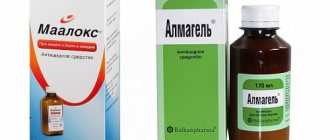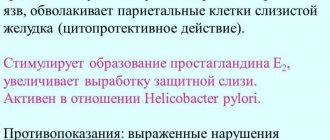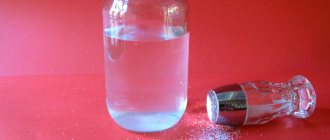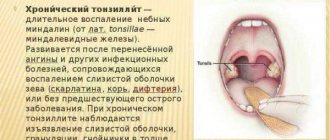How to treat intestinal disorder?
To figure out what to take for intestinal upset, you need to know what causes it. Most often this is:
- action of the virus. Diarrhea can be caused by adeno-, entero- and rotaviruses;
- action of bacteria. Bacterial infections include salmonellosis, dysentery, Pseudomonas aeruginosa, cholera, escherichiosis;
- intoxication. This could be poisoning from food, chemicals, household chemicals, or other substances;
- intestinal diseases. Diarrhea can develop due to enterocolitis, enteritis, ulcerative colitis, etc.;
Figure 3 - Dozens of factors can cause diarrhea
- lack of enzymes. When the body produces few enzymes, food is not completely digested. The composition of the microflora changes, the intestinal walls become irritated, and diarrhea becomes chronic. This occurs with cholelithiasis, pancreatitis, fermentopathy, congenital intolerance to nutrients and foods (for example, cow's milk proteins, gluten);
- autoimmune diseases. Most often, diarrhea is observed with food allergies, atopic dermatitis and even rheumatoid arthritis;
- bleeding from the intestines and other organs of the gastrointestinal tract (ulcers, fissures);
- tumors – diverticula, polyps, etc.;
- medicines. Diarrhea can occur during antibiotic therapy or after its completion, with the abuse of laxatives and cytostatics;
- stress and increased nervousness. This type of diarrhea is popularly called “bear disease.”
Figure 4 - How to treat an intestinal disorder depends on its cause
During pregnancy, diarrhea may occur on its own. This is due to hormonal changes and increasing pressure from the fetus on the intestines. The constantly growing uterus also puts pressure on the stomach, which often provokes heartburn and, less often, more serious digestive disorders. Only doctors should advise expectant mothers what to take if they have an upset stomach and intestines.
The general rule for treating diarrhea of various etiologies is to drink plenty of fluids and follow a diet. With bowel movements, the body loses a lot of fluid, which must be constantly replenished. Oral rehydration solutions work best for this. Their advantage over water is the content of sodium, chlorine, glucose, medicinal plant extracts, and cereal decoctions (depending on the type and dosage form of the drug). By taking such solutions, patients restore the balance of microelements (sodium, chlorine), gain strength (glucose), and soothe the intestinal walls (extracts, decoctions).
What to drink if you have an intestinal disorder? Lots of salted liquid.
Figure 5 - If you have diarrhea, it is important to drink a lot
To prepare a rehydration solution, you can use:
- powders and granules: Hydrovit, Glucosolan, Normohydron, Regidron, Humana electrolyte, Citraglucosolan;
- tablets: Gastrolit.
You can make your own oral rehydration solution. To do this, you need to dissolve 3 g of salt and 18 g of sugar in 1 liter of water.
What medications to take in the future for intestinal disorders, and whether they are needed, will be determined by tests and information collected by the doctor about the events preceding the onset of diarrhea.
Enterosorbents for diarrhea
The use of enterosobrents is considered one of the most effective remedies against diarrhea, which is caused by poisoning. The action of this group of drugs is aimed at absorbing toxic substances that enter the gastrointestinal tract from the outside.
The most popular enterosorbents are:
1) Activated carbon
Activated carbon is one of the cheapest, most accessible and fastest-acting agents. This is a truly “folk” drug, the use of which has many indications. For diarrhea, activated charcoal can be used immediately, since it is indicated for various forms of salmonellosis and dysentery, as well as for non-infectious causes of diarrhea and food poisoning.
Pros:
- Affordable price;
- Time-tested healing effect;
- Possibility of rapid removal of toxic substances from the body;
- Natural base;
- The drug does not have a traumatic effect on the intestines.
Minuses:
- The need to take a large number of tablets at one time;
- Black coloring of stool;
- In addition to toxins, the drug is able to remove its own microflora from the intestines, which is associated with the risk of developing dysbiosis and nutritional deficiencies;
- Long-term use of the drug threatens the development of constipation and exhaustion.
The price of activated carbon is about 50 rubles.
2) Smecta
Smecta (see instructions and reviews), or dioctahedral smectite, is an antidiarrheal agent and absorbent, and it was included in the drug rating as a natural aluminosilicate of natural origin. It, like many other sorbents, is excreted from the body unchanged and does not enter into metabolism. It is used in both children and adults for acute diarrhea and chronic diarrhea of various origins, including infectious. It is also successfully prescribed for bloating and discomfort in the abdomen.
Smecta should be used by an adult in the amount of 6 sachets per day. Treatment is carried out between meals, and separately from taking other medications. You can purchase 12 sachets, packaged in 3 g each in the form of a suspension for oral administration, at a price of 220 rubles. The manufacturer of the product is French.
Pros:
- High adsorbing properties;
- Ease of use;
- Pleasant taste;
- Possibility of treatment in childhood;
- Effective for diarrhea of almost any origin;
- In addition to stopping diarrhea, Smecta helps eliminate other unpleasant symptoms, such as heartburn and abdominal pain.
Minuses:
- Relatively high price of the drug;
- The likelihood of skin rashes, especially in childhood.
Smecta's price is about 170 rubles.
3) Polysorb
Polysorb is produced on the basis of colloidal silicon dioxide, which has powerful absorbent and detoxifying properties.
Available in powder form, from which a suspension is prepared before administration. Polysorb is prescribed for intestinal infections of various etiologies, accompanied by diarrhea, nausea, vomiting and other symptoms of intoxication. Restrictions on the use of the drug are acute peptic ulcer disease, gastric bleeding, intestinal atony, and individual intolerance.
For children under seven years of age, the dose of the drug is 150 milligrams per kilogram of body weight. For adults, the daily dose of Polysorb is 12 grams. The duration of treatment is from three to seven days. If necessary, it can be continued for up to two weeks.
Price – from 280 rubles.
"First aid" for intestinal upset
While the cause of the intestinal disorder has not been reliably determined, the following will help alleviate the patient’s condition:
- drinking plenty of water;
- diet. Until the cause of diarrhea is determined, it is recommended to limit food intake as much as possible. You can eat viscous porridge, steamed or boiled lean meat;
- enterosorbents are substances that absorb toxins, poisons, irritants from the gastrointestinal tract and remove them out. Universal medicines for stomach and intestinal upsets - Polysorb, Enterosgel, Algisorb, Pektovit, Colistyramine, Smecta, Polyphepan, activated (black tablets) and white coal. For the intestines, there is no difference between black and white coal; both drugs are safe and effective. The only difference is that white coal adsorbs toxins more actively, so you need to drink much less of it (2-4 capsules of “white” versus 6-8 tablets of “black”).
For example, you can drink Regidron and activated carbon. But there is no need to rush into taking antidiarrheal drugs. If diarrhea is caused by poisoning or intoxication, you must first remove the harmful substance from the body, and then begin to deal with frequent bowel movements. If you stop diarrhea earlier, the harmful substances will be completely absorbed into the blood, and it will only get worse.
Figure 6 - Activated carbon - the most famous fighter against intestinal disorders
Tablets for intestinal upset
Antidiarrheal drugs (Loperamide, Phthalazol, Imodium Express, Lopedium, Stopdiar, Superilol) slow down the motility of the gastrointestinal tract, as a result of which diarrhea stops. They allow you to get rid of cramps for a while so you can get home or to the doctor. But to eliminate the cause of diarrhea, additional medications will be required, for example, in the case of a bacterial infection, antibiotics. For stomach and intestinal upsets, medications can be taken in the form of tablets or powders.
Papaverine, No-Shpa, Drotaverine, Papazol, Spazmalgon, Niaspam, Neobutin will help cope with spasm and the pain syndrome caused by it.
Tablets for stomach and intestinal upset are best taken with water or rehydration solution. Drinks that enhance peristalsis (coffee, tea, soda) are prohibited - they weaken the effect of the drugs.
Figure 7 - If you have an intestinal disorder, do not rush to take pills - first consult your doctor
Classification
Fast-acting remedies for diarrhea are divided into 4 groups:
- Probiotics are drugs that are used to relieve symptoms of dysbiosis, one of which is diarrhea;
- Medicines aimed at slowing down the wave-like contractions of the walls of the rectum - peristalsis;
- Antibiotics that eliminate the cause of diarrhea - intestinal infections;
- Enterosorbents are means for binding exogenous and endogenous substances in the gastrointestinal tract by increasing adsorption, absorption, complexation and ion exchange.
How to treat intestinal upset after taking antibiotics?
Along with the harmful bacteria that cause the disease, antibiotics also destroy beneficial microorganisms. The intestinal microflora suffers most from their action. To avoid dysbiosis and associated intestinal disorders, when taking antibiotics you should drink probiotics, for example, Lactiale, Bifidumbacterin, Enterozermina, Linex or Hilak forte. If digestive disorders are systemic in nature, it is better to use synbiotics instead of probiotics, for example, Fluvir or Derma Pro. These are combination drugs that contain both prebiotics and probiotics. They are more expensive, but supply the body with more beneficial bacteria.
You need to take probiotics longer than antibiotics. For example, if the course of antibiotic treatment is 10 days, probiotics should be taken for up to 14 days. You need to take the probiotic at least 3 hours after taking the antibiotic. For example, if you take antibiotics at 8:00 and 20:00, then probiotics can be taken at 11:00 and 23:00.
Antibiotic-related bowel upset may begin 2 to 3 days after finishing treatment. In this case, you need to take a new drug for the intestines. For example, if you took a probiotic, you need to drink a synbiotic. Before this, of course, you need to consult with the doctor who prescribed the antibiotic, or with a gastroenterologist.
Figure 8 - Taking antibiotics is a common cause of diarrhea
It is best to select probiotics based on the results of stool culture. In this case, you will populate the intestines with exactly the bacteria that are lacking there. However, culture results have to wait 4–5 days, and diarrhea must be prevented as quickly as possible. Therefore, when prescribing probiotics, the decision is made almost at random.
Some patients prefer to use natural yoghurts instead of probiotics. This method of restoring beneficial intestinal microflora deserves attention provided that you are not allergic to milk. The main disadvantage of the method is that it is not known for certain which bacteria enter the body and their dosage. There may not be enough bacteria and diarrhea will still occur.
Probiotics for diarrhea
Acylact
Acylact is a probiotic that is often used for diarrhea. It is available in the form of suppositories and tablets, as well as lyophilisate. The drug contains live acidophilus lactobacilli.
Acylact is effective for diarrhea caused by dysbacteriosis. The drug can be used for prophylactic purposes during antibiotic treatment. It is also recommended for parasitic infestations, for example, helminthiasis. Treatment with lyophilisate is possible for colitis and enterocolitis, as well as rotavirus gastroenteritis.
Taking the drug can reduce the severity of diarrhea and normalize the intestinal microflora. The tablets must be washed down with a sufficient amount of water; if a lyophilisate is used, it must first be diluted with warm water. The average duration of treatment for diarrhea is two weeks.
The drug is not prescribed in childhood. The most common side effect is an allergic reaction. Acylact should be stored in the refrigerator.
Bifidumbacterin
Bifidumbacterin is one of the effective probiotics that helps restore intestinal microflora, so it is actively used for various forms of diarrhea. The drug contains live bifidobacteria and bifidogenic factor, which promotes the growth of “beneficial” bacterial flora in the intestines.
The drug is safe for human health; it is prescribed even to newborn children.
Bifidobacteria, which are part of Bifidumbacterin, gradually colonize the intestines, contribute to the suppression of pathogenic flora, stabilize metabolic processes, increase local immunity, and make it possible to better cope with intoxication of the body.
After taking Bifidumbacterin, diarrhea gradually begins to fade and completely disappears within 5-7 days. The drug is not prescribed for intestinal infections, food poisoning, irritable bowel syndrome, diarrhea caused by an allergic reaction, colitis and enteritis.
The drug has no contraindications, with the exception of individual intolerance to the components included in its composition. It should be taken either with meals or half an hour before the start of the meal.
Bifidumbacterin has several forms of release: in suppositories, in capsules, in powder. The course of treatment can be quite long (up to several months), and if necessary it can be repeated.
Pros:
- High efficiency and quick results;
- Possibility of using the drug for the treatment of newborns and pregnant women;
- Good compatibility with other drugs.
Minuses:
- Relatively high price (if long-term treatment is necessary, you will have to spend an impressive amount);
- Specific storage conditions (can only be stored in the refrigerator);
- The likelihood of an allergic reaction.
The price of Bifidumbacterin varies from 200 to 500 rubles.
Lactobacterin
Lactobacterin is a drug that comes in powder form and contains live lactobacilli. Taking Lactobacterin helps populate the intestines with beneficial bacteria, inhibit the growth of pathogenic flora, increase local immunity, and stop diarrhea.
The drug is prescribed for intestinal infections of various origins, and for dysbiosis while taking antibiotics. Lactobacterin has no side effects; allergic reactions are extremely rare. The drug can be used to treat children, nursing and pregnant women. The duration of the course is determined by the doctor. For children under 6 months of age, Lactobacterin is diluted in breast milk.
Lactobacterin is highly resistant to antibiotics, so it can be taken during antibacterial therapy. The drug should be stored in the refrigerator.
Linex
Linex is a eubiotic drug that is available in capsules. Taking Linex allows you to restore the intestinal microflora, since the medicine contains several types of live lactic acid bacteria.
Linex helps inhibit the growth and reproduction of pathogenic flora, ensures the proper functioning of digestive enzymes, increases the body's resistance to adverse environmental factors, and strengthens the immune system.
Linex is prescribed for stool disorders, regardless of the cause that caused it: for food poisoning, for diarrhea caused by intestinal infections and allergic reactions. In addition to eliminating diarrhea, Linex can reduce flatulence, stop vomiting, nausea and belching, and relieve abdominal pain.
The drug has virtually no contraindications, except for hypersensitivity to the components included in its composition. The medicine can be used during pregnancy and breastfeeding. Linex is taken after meals with water.
If children under three years of age are being treated, the capsule is first opened, the powder is diluted in a spoonful of water and offered to the child. Adults are prescribed 2 capsules 3 times a day.
Linex does not interact with other drugs, so it can be used as part of complex therapy for diarrhea.
Do not combine the drug with alcoholic beverages or wash it down with hot water.
Hilak Forte
Hilak Forte is an effective German antidiarrheal agent, produced in the form of drops. Taking the drug helps normalize the intestinal microflora, preserves its physiological and biological functions, and restores the normal level of acidity in the gastrointestinal tract.
Hilak Forte can be used for diarrhea caused by taking antibiotics, gastroenteritis, colitis, allergies, salmonellosis. It is effectively used to treat traveler's diarrhea, which is caused by climate change and exotic foods.
The drug can be used to treat children and pregnant women, as well as during breastfeeding. It has virtually no contraindications, except for hypersensitivity to its components.
Hilak Forte is well tolerated by patients of all ages. Allergic reactions in the form of skin itching and rashes are extremely rare. You should not take the drug with milk or milk-based products at the same time. The medicine does not require storage in the refrigerator.
Acipol
Acipol is a mixture of live acidophilic lactobacilli and kefir grains. The drug is available in capsules. Their intake helps to normalize the intestinal flora, suppresses the growth and development of pathogenic microorganisms, and improves immunity.
Acipol is prescribed for diarrhea due to dysbacteriosis, for acute intestinal infections, for chronic colitis, and rotavirus gastroenteritis. It is possible to use Acipol during long-term treatment with antibiotics to prevent diarrhea.
The capsule is washed down with boiled water at room temperature. Adult patients are recommended to take 1 capsule 3 times a day. The duration of treatment for acute diarrhea is 8 days. If necessary, the doctor can increase this period to 15 days. The drug has no contraindications or side effects.
How to treat intestinal upset caused by poisoning?
Poisoning is easily recognized by vomiting with a further increase in temperature. In this case, the most important thing is to remove the toxic substance and decay products from the body as quickly as possible. Therefore, do not rush to take Loperamide and analogues. Induce vomiting, rinse the stomach. Then drink any sorbent, for example, activated carbon, and try to drink as much as possible. For the first day, it is better not to eat at all, try to lie down more, especially if the temperature has risen. On the second day, you can start eating dietary foods: light broths, pureed soups with rice and vegetables, liquid viscous porridges, jelly. Anything that irritates the walls of the stomach is prohibited: soda, marinades, smoked foods, sweets, fatty foods.
In case of poisoning, the liver suffers, so at the same time as medications for stomach and intestinal upsets, you need to take hepatoprotectors (for example, Gepabene, Karsil, Ursoliv, Essentiale Forte N). Milk thistle seed meal is considered a good natural hepatoprotector, but if you have diarrhea, you should not take it - it will irritate the intestinal walls.
Figure 9 - Diarrhea during poisoning is a protective mechanism that removes harmful substances from the body
Antibiotics for diarrhea
Antibiotics for diarrhea are taken only if the cause of diarrhea is accurately determined. If this stool problem is caused by an intestinal bacterial infection, then only then is taking antibiotics a justifiable solution. Visually, the presence of an intraintestinal infection can be determined by characteristic impurities in the stool: mucus and bloody greenish inclusions.
In such cases, the following antibiotic medications are prescribed:
1) Amoxicillin
A chloramphenicol-based antibiotic commonly prescribed to patients with persistent diarrhea. The active substance destroys a wide range of pathogenic microflora, including those pathogens that have developed resistance to the action of tetracycline antibiotics.
Levomycetin is prescribed for the treatment of infectious diarrhea. This drug can provoke adverse reactions from various body systems, so before use you should clarify the contraindications for use. Among them are renal and liver failure, pregnancy, individual intolerance to the active substance.
Pros:
- Affordable price;
- Time-tested effectiveness of the drug;
- Availability of several forms of release;
- Wide spectrum of antibacterial activity;
- High bioavailability;
- Can be used in childhood, but not earlier than 4 weeks.
Minuses:
- Extensive list of contraindications and side effects;
- The need for hospitalization when treated with large doses of the drug.
The price of Levomycetin is about 120 rubles.
2) Enterofuril (Nifuroxazide)
An antimicrobial agent based on nifuroxazide provides a pronounced bacteriostatic effect against staphylococci, streptococci, salmonella, shigella, enterobacteria and suppresses the production of toxins that poison the body. For diarrhea of viral origin, it reduces the risk of bacterial superinfection. Adults are recommended to take Enterofuril in capsules; for children, the medicine is released in the form of a suspension.
The drug is prescribed for acute and chronic forms of infectious diarrhea, stool disorders associated with inflammatory lesions of the large intestine, as well as diarrhea of unknown origin. This remedy has virtually no contraindications, rarely causes adverse reactions and does not provoke the development of dysbacteriosis. The only limitation for use is the body's increased sensitivity to nifuroxazide. The price of Enterofuril in capsules ranges from 200 to 220 rubles.
3) Furazolidone
Furazolidone is a drug from the group of intestinal antibiotics. It has a broad spectrum of antibacterial activity, so it can be used in the treatment of infectious diarrhea and diarrhea caused by food poisoning.
The drug is available in the form of tablets that cannot be chewed; they are drunk whole, immediately after eating. The duration of the therapeutic course is determined by the doctor, usually about 14 days. The average daily dose for an adult patient is 4 tablets.
Pros:
- Affordable price;
- High antibacterial effect;
- Possibility of treating most intestinal infections;
- The presence of a protective coating on the tablet, which allows the drug to begin to act in the intestines;
Minuses:
- Abundance of contraindications and side effects;
- The need for medical consultation before starting treatment;
- Inability to use the drug to treat young children and pregnant women.
The price of Furazolidone varies from 100 to 150 rubles.










